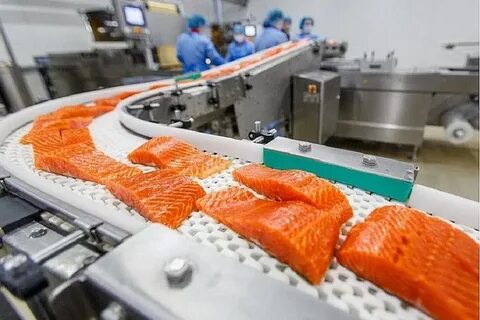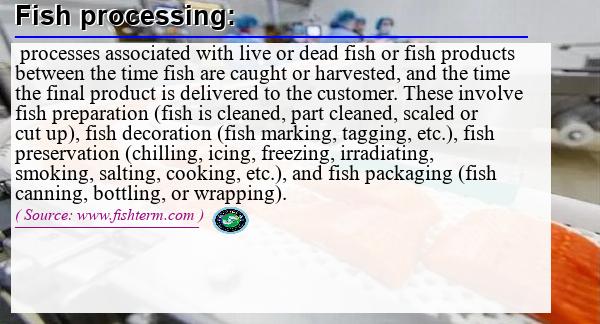Fish processing - meaning and illustration

TABLE OF CONTENTS
Reading time:
4 minutes
Last modified:
2024-01-20 00:00:00
1. Synonyms, etymology, translation, definition, examples and notes
1.2. IPA transcription and prononciation for fish processing:
Fish processing /fɪʃ ˈprəʊsesɪŋ/
Graph 1 : fish processing - Google ngram extract ( graph of term etymology and evolution. Source: Google ngram )
1.3. Etymology of Fish processing:
From an ngram word frequency chart, it could be seen that, the term fish processing originated in the twentieth century, precisely before 1940 (confer the chart above). The term gained more popularity as years went by, right up to around the 1980’s, where the term ‘fish processing’ started declining in frequency, probably due to it being replaced with new synonyms like ‘seafood processing’. How ever, we consider seafood processing to be a broader concept than fish processing, meaning not just the processing of fish but goes farther to include all seafoods in general (crabs, etc.).1.5. Definition of fish processing in fisheries:

1.6. Notes on fish processing
Types of fish or seafood processing
Depending on the processes used, processing can be grouped under the several categories. These include:- Fish preparation: this includes processes that seek to make the fish neater and easier to work with – usually prior to further processing. Cleaning, scaling, trimming, gutting, and filleting of fish are all methods of fish preparation. For example, fish can be filleted prior to canning.
- Fish transformation: includes the production of any substance or article from fish, leading to derived and/or by-products. All mechanical or chemical operations that change the physical structure or chemical content of fish. During the production of fish meal and fish oil, the fish are transformed into a different physical and chemical structure.
- Fish decoration: any process of artificially adding items or paintings to the flesh or fins of a fish to alter its colour or ease identification. Some of these decorative processes include fish marking, tagging, pin clipping, etc.
- Fish preservation: fish being very perishable, often require processes to slow down the decay process and reduce further infection. This stage often involves processes like chilling, icing, freezing, irradiating, smoking, salting, cooking, etc.
- Fish packaging: this is a fish processing method whereby the fish is enclosed from external contact. E.g. fish canning, bottling, or wrapping.
Fishery terminology records for Fish processing
1. Law No. 94/01 of 20 January 1994 to lay down forestry, wildlife and fisheries regulations in Cameroon, Chapter I, article 113, paragraph 1:
" Within the meaning of the present law: 1) Fish processing establishments shall comprise: a) Fishmongering establishments which prepare fishery products, especially by sorting, washing, weighing and icing. b) Freezing establishments which preserve fish by means of freezing or simply store frozen products. c)Smoking houses or workshops which smoke fish and fishery products using wood or by-products of wood. d) Drying workshops which dehydrate fishery products through the direct action of heat produced by solar energy or some other source. e) Salting workshops which process fishery products by using exclusively sea salt or its substitutes. "
LEAVE A COMMENT




 Linkedin
Linkedin share
share tweet
tweet